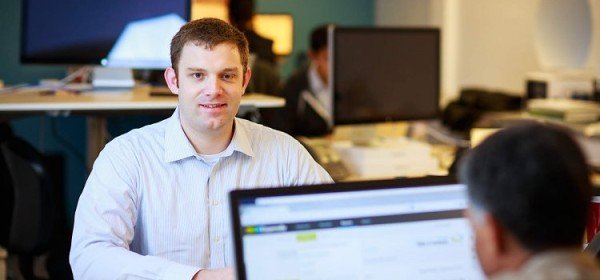Comprehend's Rick Morrison on the Importance of Asking Questions
by Y Combinator12/11/2015

In this episode of Startup School Radio, host and YC partner Aaron Harris sat down with Rick Morrison, the CEO and co-founder of Comprehend.
You can subscribe to Startup School Radio on Soundcloud or iTunes.
Comprehend is an enterprise software company that makes a cloud platform that helps pharmaceutical companies analyze clinical trial data more accurately and efficiently. Comprehend, which launched out of Y Combinator in Winter 2011, announced in August 2015 that it had raised $21 million in Series B funding.
Later in this episode, Harris also interviewed Jake Klamka, the founder of Insight Data Science. You can listen to the entire episode in Soundcloud right here, or via iTunes.
One highlight of the episode was hearing Rick talk about how getting started in the enterprise pharmaceutical space is quite different from launching a consumer software or web product. He says it was especially important for he and his co-founder to spend time and money meeting with potential customers, asking them the right questions, and really listening to their answers. This portion starts at minute 4:00:
Aaron : Do you think that it’s harder to go after at industry like pharmaceuticals when building a company, than it is to go after some mass adopted consumer application?
Rick : I mean, there are different challenges. In a mass-adopted consumer application, you have to keep on getting user growth. You have millions of users, and you can’t necessarily go fly out and talk to every single one of them. In the pharmaceutical space, for example, you do need to understand specifics about how clinical trials work and other in-house certain regulations work. And that that does provide a barrier to entry.
…When we first raised our seed round, we had maybe half a million dollars in the bank, or maybe a little bit less. Even just to go to some of these trade shows would cost $10,000, $15,000, just in the admission fees. So the [clients] are used to companies that have a lot of money, that spend a lot of money. And it’s really hard when you’re trying to very carefully and frugally spend your own money to just do your own [market] research. It becomes tough.
Aaron : How do you square that away with the idea that startups need to be scrappy? I mean there’s only so much money. You have to treat every dollar like it’s the last one you have. How do you make a decision to do something like, “Hey, I’m going to go to a conference. I hope this works out. I hope this gets me a customer.”
Rick : Yeah, it is really careful. So we actually first started thinking about the company in 2009. And we actually founded the company in 2010. But before we did so, both my co-founder and I went to three or four conferences, and paid for it out of pocket. It was like $15,000, $20,000 plus each, just in airfare and other stuff, just doing our research. We were hopefully going to find a customer, but it certainly did not happen at the time. Listening, thinking, talking to people.
And it is tough. But these are decisions that you just have to be very thoughtful about, and you do have to place your bets.
…I was keenly interested in starting a company. I had seen for about eight years total [while working for a pharmaceutical company] just the pain and the problems in this space, and the huge opportunity that was available. My co-founder also was highly motivated to start a company and also happened to have started a consulting company in the space working with the same type of customers. So we both had experience.
But although we had an idea, and we thought we understood what the problem was, we really needed to just get in front of potential customers and get in front of these companies, and vet it and understand it, and really just try to understand what it was that keeps them up at night so that we can make sure that, if we’re going to continue to invest, we’re going to do it intelligently.
Aaron : When Paul Buchheit was on the show a few weeks ago, he was talking about how, when they launched Gmail, he went through the process of getting a hundred users. It was getting a hundred users that really love your product. That’s proof that you’re on to something. And with him, initially it was Google employees, and he was able to go and talk to them.
When you’re talking about a business like yours, a hundred would be a very large number of customers, because we’re talking about big enterprise clients. So at those earliest stages, what are you looking for in terms of proof that you’re on to something, that you should actually quit your jobs and do this full-time?
Rick : In the case of Gmail, for example, he, in that case, was the user. So he actually could really just look at himself and determine what it is he wanted. In the case of Comprehend, Comprehend makes tools to help clinical trials run more efficiently, to help them run the operations more efficiently, help them understand what’s happening, and also to deliver higher quality results than otherwise possible. So it’s not simply the case that we can go easily find a hundred clinical trials that are going to run their operations on our platform or solutions.
So what you have to do is you really have to listen. I think really the most important thing from my perspective at the time was, what really is the problem? What really are you having trouble doing? What is it you’re trying to accomplish, and what is preventing that? I had actually seen quite a bit of it through my experience, as has my co-founder. So we had some suggestions. And we were able to ask questions to potential customers and to prospects and to other people and really just try to suss out where the opportunity was.
Subscribe to Startup School Radio on Soundcloud or iTunes.
Other Posts
Author

Y Combinator
Y Combinator created a new model for funding early stage startups. Twice a year we invest a small amount of money ($150k) in a large number of startups (recently 200). The startups move to Silicon